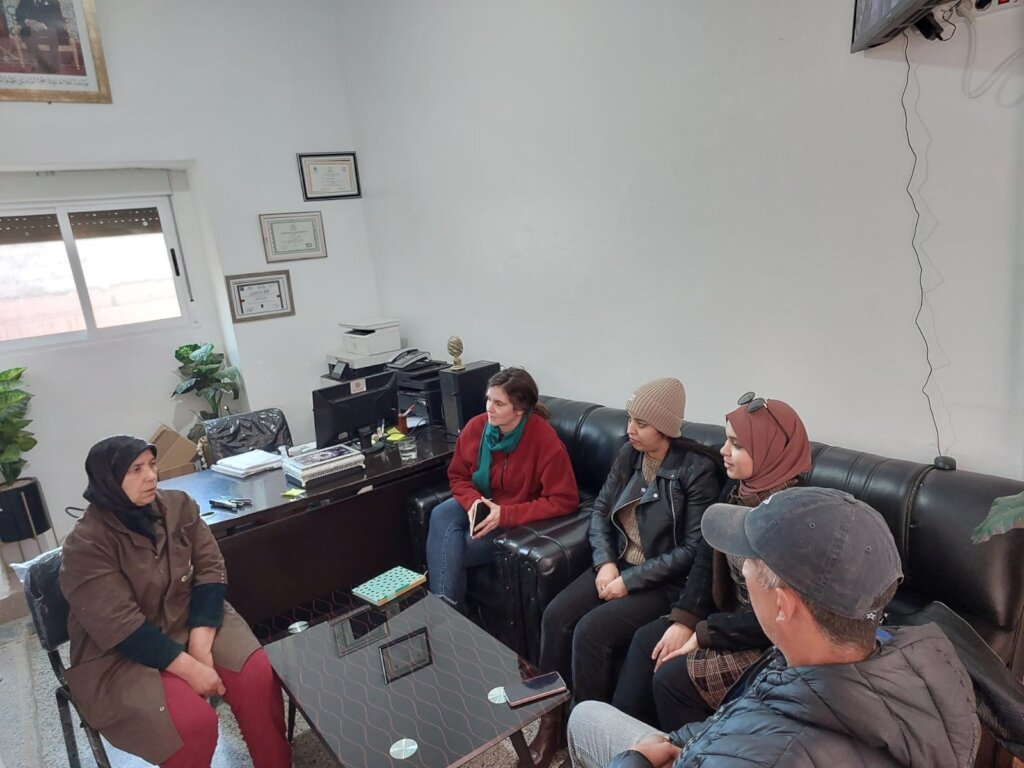By Jennifer Anne Sopoci | F2F US Volunteer, HAF
Prior to my arrival in Morocco on January 30, I had spoken with Aziz, the president of the Bio-Agri Atlas Farming Cooperative of Oulad Mbark. We discussed the drought that Morocco has been experiencing and the negative effects it has had on the farmers in the cooperative and region. He expressed the cooperative's need to learn more about climate change, how it affects food systems, and agricultural practices they can put into action to retain soil moisture and manage water more effectively. I came with practical farming field experience methods of reducing soil erosion and protecting and building the microbial ecosystem in the soil.
I spent many hours researching climate change in Morocco in the past, present, and future, and reading research that has been conducted as to its effects on the environment and its people. I researched innovations and technologies for adapting to climate change in Morocco and the MENA region. I also spent time coordinating with universities and agricultural extension programs from arid regions of the USA, specifically the University of Arizona Department of Environmental Science and the University of California Davis Agriculture Extension program.
I spoke with Dr. Joseph, professor of soil ecology and soil health, from UofA about his research into soil microbial effects of climate change in Arizona and how we might perform field tests in Morocco to evaluate microbial populations. He provided valuable insight into the most important information to know when looking at living soil in arid environments as well as a donation of quick soil test kits that he believed would be valuable to the farmers of Ouled Mbarak.
I also corresponded with the University of California Davis Agricultural Extension offices about their climate-smart agriculture (CSA) programs, research, and most importantly outreach and education. They shared with me their approach to educating farmers about climate change and recommendations for adapting to their changing environment, including the use of drought-tolerant crops. Although not all of the information can be readily transferable to Morocco because of the resources and technology available, the main pillars and principles of CSA are the same. From my discussion with Aziz, my practical farming experience, my research, and my coordination with Universities I prepared a PowerPoint presentation on climate change in Morocco and how farmers can use CSA to adapt.
On January 31, I met with Si Larbi, a retired official from the Department of Water and Forest with extensive knowledge of farming and related resources in Morocco. I wanted to discuss with him the process of farmers obtaining drip irrigation reimbursement through the government's Green Morocco Plan so that I would be able to accurately share this information with the farmers of Oulad Mbark. We also discussed various strategies for soil moisture retention that he had seen in Morocco such as using rocks as mulch around trees to reduce evaporation and plastic coverings over the soil.
On February 1 we arrived at the host cooperative (Sanaad Cooperative) in Oulad Mbark to meet with Aziz Taouri, the president of the Bio- Agri Atlas Cooperative of farmers. We discussed their current crop rotations and plans for planting in the coming year. We also discussed their methods for determining soil moisture, regional rainfall predictions, available water resources, and the use of drip irrigation. Aziz also informed me of the other related activities we would be doing in Beni Mellal, specifically visiting climate change researchers at the University Sultan Moulay Slimane School of Science and Technology and a tree planting activity at a local primary school dedicated to ecological education.
Project reports on GlobalGiving are posted directly to globalgiving.org by Project Leaders as they are completed, generally every 3-4 months. To protect the integrity of these documents, GlobalGiving does not alter them; therefore you may find some language or formatting issues.
If you donate to this project or have donated to this project, you can receive an email when this project posts a report. You can also subscribe for reports without donating.
Support this important cause by creating a personalized fundraising page.
Start a Fundraiser